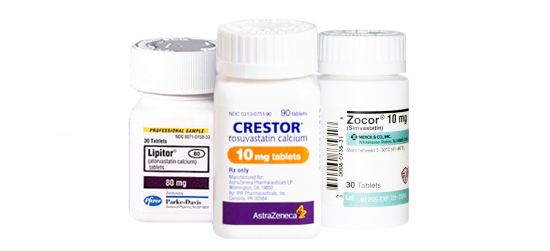{Health} Is your statin safe?
The FDA is adding new warnings to this popular drug. Here’s what you need to know now.
—————————————————————————————————
If you’re over fifty in America, there’s a good chance you’re taking a statin. Nearly 22 percent of adults 45 or older take one of these cholesterol-lowering drugs, making them the most commonly prescribed medications in the world.
Last week, the FDA added new safety alerts to statin labels, including reported side effects of memory loss, confusion, and a higher risk for Type 2 diabetes. Not surprisingly, many people panicked. Medical message boards were flooded with questions like, “Will Zocor give me dementia?” and “Is Lipitor making me sick?” A cursory google search brings up dozens of sites claiming statins are dangerous, unnecessary, over-prescribed—even a corporate conspiracy. Still, the FDA insists that this new information should not “scare people off statins. The value of statins in preventing heart disease has been clearly established. Their benefit is indisputable.”
 So what’s the real story? For answers, we turned to a source we truly trust, Dr. Steve Nissen, Cleveland Clinic Chairman of Cardiovascular Medicine. Named one of Time magazine’s 100 most influential people, Dr. Nissen is not only a leading cardiologist and researcher, he’s also a leading patient advocate. He has has led inquiries as to the scientific integrity of many big-name medications currently on the market. In other words, he’s not afraid to question the status quo. Here, he answers all our questions.
So what’s the real story? For answers, we turned to a source we truly trust, Dr. Steve Nissen, Cleveland Clinic Chairman of Cardiovascular Medicine. Named one of Time magazine’s 100 most influential people, Dr. Nissen is not only a leading cardiologist and researcher, he’s also a leading patient advocate. He has has led inquiries as to the scientific integrity of many big-name medications currently on the market. In other words, he’s not afraid to question the status quo. Here, he answers all our questions.
FOF: If you are currently taking a statin medication, should you consider stopping as a result of this report?
Dr. Nissen: No patient should stop a medication because she hears a news report. These decisions should always be made through a discussion with your doctor. Most authorities do not believe that these new warnings represent a major change in thinking about statin drugs. We’ve known for several years, for example, that statins do very slightly push up blood sugar. That means, if you’re just under the threshold for diabetes, you’ll cross over and be labeled as having diabetes. But, in those patients for whom the blood sugar did go up a little bit, the benefits of the drug remained the same. The diseases that statins prevent–like heart attack stroke–are still reduced equally well.
Still, it’s alarming how many people are on statins. Do you think these pills are over prescribed?
I do. Doctors need to stick with the guidelines, which are very carefully worded so that patients at high cardiovascular risk are recommended for receiving statins, and patients who are at low risk are not. There are a certain number of people–I’ll call them the ‘worried well’–who are treated with statins by their doctors but who don’t really meet the current criteria. Those people are better off using diet, exercise and other means to control their cholesterol elevation. But, there are equally large numbers of patients who meet all the criteria for receiving a statin and who aren’t on them. The key is to make sure the right patients get these drugs.
How do you know if you should be taking a statin or if you’re one of the “worried well”?
There is a risk calculator available online called the Framinghan Risk Score. If you put in your numbers (age, cholesterol, blood pressure, etc) it will give you your 10-year risk of having a heart attack. If you come out well under 10% risk for 10 years, your risk is low, and you likely don’t need to be on a statin. If you’ve had a heart attack, you should be on a statin–period. If your LDL cholesterol reaches a certain level–above 160-190–we will treat you with a statin even if they have minimal other risk factors.
If your doctor says you need to be on a statin, but you are still concerned, what do you need to say to your doctor to make sure you’re getting the right treatment?
Ask exactly what calculations he or she using to determine your treatment. Did he or she use the Framingham or another similar tool? If you still have doubts, it is never a bad idea to get a second opinion.
What if you’re on a statin and you’re experiencing some of these side effects. Should you be worried?
Every drug has a degree of tolerability that differs from patient to patient. Good medicine is about customization. The goal is to find the drug in the dosage that works for you with the least side effects possible.
There are many sites on the web with experts who claim that these drugs are way over prescribed, and that there are “natural” alternatives to lower your bad cholesterol without jumping on a statin.
I have a very simple answer for those sites: nonsense. There are no “natural” alternatives to statins. The dietary supplement industry is unregulated, so they make these claims but there’s no science to back them up. Don’t be fooled by these promotions of dietary supplements—they simply don’t lower cholesterol.
So maybe there isn’t a supplement. But what about changing your diet and exercise? Can behavioral changes be a good alternative to statins?
A statin should always be coupled with behavioral changes. Good and prudent doctors always couple lifestyle changes with drug therapy. Using these behavioral changes as an alternative to a statin depends on your level of risk–every patient is a little bit different.
If you’re on the borderline of taking a statin, should these side effects be a motivation to make changes to your lifestyle so you don’t have to go one one?
It’s not that easy, and here’s why. Lifestyle changes typically don’t reduce cholesterol by more the 10-15 percent. Statins reduce cholesterol levels by 30-60 percent.If your numbers are high enough that you need a statin, the odds are good that you’re not going to get them down with diet alone, unless you’re willing to take on an extreme diet…and most people can’t sustain that.
Why would you be in a situation where your cholesterol levels are so high that there’s nothing you can do but take a statin?
It’s really about genes. Only 20 percent of cholesterol level comes from your environment…80% comes from your genes. That’s one reasons that diet can only lower cholesterol so much.
What about people who say that these drugs are being over-prescribed because of all the marketing being done by big pharmaceutical companies?
There’s a marketing element here absolutely. Having said that, we have probably saved more lives by lowering choesterol levels with statins than with any other drugs in the history of the medical profession. The only thing that comes close probably is penicillin.
If there is one single change you could be making to lower your bad cholestorol–apart from a statin–what would it be?
Reduce your intake of saturated fat in your diet–butter and meat.


